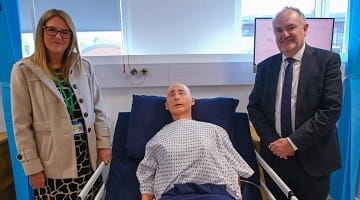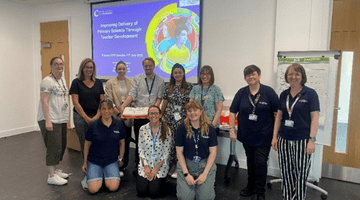About this course
LJMU's Clinical Pharmacy MSc enables primary care and community pharmacists to maximise their role within interprofessional settings.
- Aimed at pharmacists working in community pharmacies, general medical practices or hospital outpatient pharmacies operated by community providers
- Apply your skills to your day-to-day work and enhance your practice from day one
- Benefit from clinical teaching designed and delivered by specialist practising pharmacists
- Study an optional Independent Prescribing pathway (accredited by the GPhC)
- Begin your studies in Spring or Autumn and enrol with the PgCert/PgDip/MSc as your target award
- Study over three years (part-time). If you wish to stage your development, it is also offered as a one year Postgraduate Certificate or two year Postgraduate Diploma, both of which can be subsequently topped up by returning to the course
This course reflects the evolving role of Pharmacists in primary care and at the interface with secondary care. It is closely aligned with the Government's published plans for the role of the Pharmacist in NHS England.
The programme aims to support you in developing your practice. It will serve as the base for successful and effective careers in Clinical Pharmacy, with those having completed the programme being equipped to effectively optimise patient care, make evidence-based recommendations around therapies and develop practice to directly benefit the patients and organisations they serve.
Course modules
Discover the building blocks of your programme
This course is currently undergoing its scheduled programme review, which may impact the advertised modules. Programme review is a standard part of the University 's approach to quality assurance and enhancement, enabling us to ensure that our courses remain up to date and maintain their high standard and relevancy. Once the review is completed, the course website page will be updated to reflect any approved changes to the advertised course. These approved changes will also be communicated to those who apply for the course to ensure they wish to proceed with their application.
Further guidance on modules
Modules are designated core or optional in accordance with professional body requirements, as applicable, and LJMU’s Academic Framework Regulations. Whilst you are required to study core modules, optional modules provide you with an element of choice. Their availability may vary and will be subject to meeting minimum student numbers.
Where changes to modules are necessary these will be communicated as appropriate.
Core modules
Optional modules
Your Learning Experience
An insight into teaching on your course
Study hours
You will be assigned a personal tutor at enrolment. Your tutor will keep in regular contact with you and support you through your studies to help you to demonstrate your competence through a professional practice portfolio.
The MSc level Research Project is undertaken in your workplace under the supervision of a University Supervisor, with support from a local mentor, where available.
The programme is delivered with the support of our Virtual Learning Environment (Canvas), which will provide a range of learning activities to develop your knowledge in clinical pharmacy and related topics. This student-led learning is supported by face-to face and virtual study days supplemented by tutorials with your tutor.
Teaching methods
The programme uses a blended learning approach including recommended reading, short recorded lectures, online quizzes, seminars, workshops and workplace-based learning. In addition to LJMU staff, expert practitioners will be involved in programme delivery.
The embedded prescribing programme was accredited by the General Pharmaceutical Council in March 2020. Successful completion of the programme will result in you being issued with a Practice Certificate in Independent Prescribing, which entitles you to apply for annotation as an independent prescriber on the GPhC or PSNI register of Pharmacists.
Please note: successful completion of an accredited course is not a guarantee of annotation or of future employment as a Pharmacist Independent Prescriber. The GPhCs accreditation report(s) and the timescales for future accreditations can be viewed here.
Applied learning
As you will be working as you study, this programme enables you to put your new found skills into practice immediately.
How learning is monitored on your programme
To cater for the wide-ranging content of our courses and the varied learning preferences of our students, we offer a range of assessment methods on each programme.
At the heart of the course is the requirement to maintain a professional practice portfolio, detailing clinical practice and personal development. Each module will involve formative and/or summative assessments, which help to contribute to this portfolio or draw on its content.
Assessment methods for this course include: written exams, oral and written case reports and written reports of activities such as practice evaluation exercises. Some modules also have competency requirements (pass/fail assessments). These components are based around demonstrating competence through Objective Structured Clinical Examinations (OSCEs) and the professional practice portfolio.
For the Master of Science Research Project Module you must submit a research project report.
All assessments are moderated by an external examiner. If your overall performance is of a very good standard you will be awarded a Merit and where performance is of an exceptional standard, a Distinction will be awarded.
Where you will study
What you can expect from your School
The programme is delivered in the student's workplace.
University staff are based in the Faculty of Science in the City Campus. Here youll find state-of-the art laboratories and teaching spaces. In terms of independent study support, the Avril Robarts Library is located just minutes away from the Faculty of Science on Tithebarn Street.
Course tutors
-
 Non Contracted
Non Contracted -
 Lecturer/Senior Lecturer
Lecturer/Senior Lecturer
Career paths
Further your career prospects
LJMU has an excellent employability record with 96% (HESA 2018) of our postgraduates in work or further study six months after graduation. Our applied learning techniques and strong industry connections ensure our students are fully prepared for the workplace on graduation and understand how to apply their knowledge in a real world context.
Completing the Clinical Pharmacy for Primary and Interface Care MSc, PG Diploma, PG Cert course will support you in developing your practices and new roles in community pharmacy and general medical practices, with prescribing and clinical pharmacy skills allowing you to begin delivering services immediately. This will help to improve job satisfaction and support new and innovative practices locally.
Tuition fees and funding
- Home part-time per year:
- £3,465
Fees
The fees quoted at the top of this page cover registration, tuition, supervision, assessment and examinations as well as:
- library membership with access to printed, multimedia and digital resources
- access to programme-appropriate software
- library and student IT support
- free on-campus wifi via eduroam
Additional costs
Although not all of the following are compulsory/relevant, you should keep in mind the costs of:
- accommodation and living expenditure
- books (should you wish to have your own copies)
- printing, photocopying and stationery
- PC/laptop (should you prefer to purchase your own for independent study and online learning activities)
- mobile phone/tablet (to access online services)
- field trips (travel and activity costs)
- placements (travel expenses and living costs)
- student visas (international students only)
- study abroad opportunities (travel costs, accommodation, visas and immunisations)
- academic conferences (travel costs)
- professional-body membership
- graduation (gown hire etc)
Funding
There are many ways to fund postgraduate study for home and international students. From loans to International Scholarships and subject-specific funding, you’ll find all of the information you need on our specialist postgraduate funding pages.
Please be aware that the UK’s departure from the EU may affect your tuition fees. Learn more about your fee status and which tuition fees are relevant to you.
Entry requirements
You will need:
Qualification requirements
How to apply
Securing your place at LJMU
To apply for this programme, you are required to complete an LJMU online application form. You will need to provide details of previous qualifications and a personal statement outlining why you wish to study this programme.
Where an applicant has previously completed an independent prescribing qualification, it may be possible to recognise this prior learning within the programme structure and credit may be granted for the relevant modules that make up the prescribing award in the present programme. This is subject to approval by LJMU at the admissions stage.
LJMU will also consider students who have obtained an appropriate Postgraduate Diploma in Clinical Pharmacy from LJMU or another institution for direct entry to the MSc research project. This allows students to 'top up' an existing PgDip to a full MSc by completion of a research project. Students applying for this route do not need to be employed in a role in England, but must be in a position that would allow them to complete a relevant research project. Individuals interested in this route should contact the course leader by emailing: PBS-Office@ljmu.ac.uk to discuss their circumstances prior to submitting an application.
How to apply
- Complete our supplementary application form
- Click ‘Apply Now’ at the top of this page and complete the online application form, taking note of the below:
- Select the course that you would like to study from the drop-down menu – ensure that you choose the correct target award (MSc, PgDip or PgCert), the course (Primary and Interface Care), entry point (March), and year. The programmes are all studied part time.
- Ensure that you have provided details of your pharmacy qualification and any other university qualifications (note: A-Level and GCSE/equivalent qualifications do not need to be listed)
- Upload the following documents to your online application:
- Certificate(s) for any qualifications listed in your application
- If applying to study the PgCert or PgDip levels of the programme a completed Employer declaration form (see Responsibilities of Employing Organisation document)
- If applying for direct entry to the PgDip or MSc year of the programme, details of your prior PgCert or PgDip and any associated certificates
- A copy of the Purchase Order authorising payment of the course from your place of work
- A copy of your IELTS certificate (if English is not your first language and you have not recently completed a university level qualification in English
NOTE: all documents must be attached to your application within 24 hours of submission – if you wish to attach documents after this date, you will need to email them to the Programme Administrator (contact details below).
School of Pharmacy and Biomolecular Sciences
Liverpool John Moores University
Byrom Street Liverpool L3 3AF
Tel: 0151 231 2248
Fax: 0151 231 2170
Email: PBS-Office@ljmu.ac.uk
Your university life
From accommodation and academic support to clubs and societies. Find out what LJMU has to offer.
Related Links
Talk to our students
Connect with a current LJMU student for advice and guidance on university life, courses and more.
See what our students are saying
At LJMU we want you to know you’re making the right choice by studying with us. You can see what our students are saying about their experience with us through their reviews on the following websites:
Related Links
News and views
Browse through the latest news and stories from the university
The University reserves the right to withdraw or make alterations to a course and facilities if necessary; this may be because such changes are deemed to be beneficial to students, are minor in nature and unlikely to impact negatively upon students or become necessary due to circumstances beyond the control of the University. Where this does happen, the University operates a policy of consultation, advice and support to all enrolled students affected by the proposed change to their course or module.



























